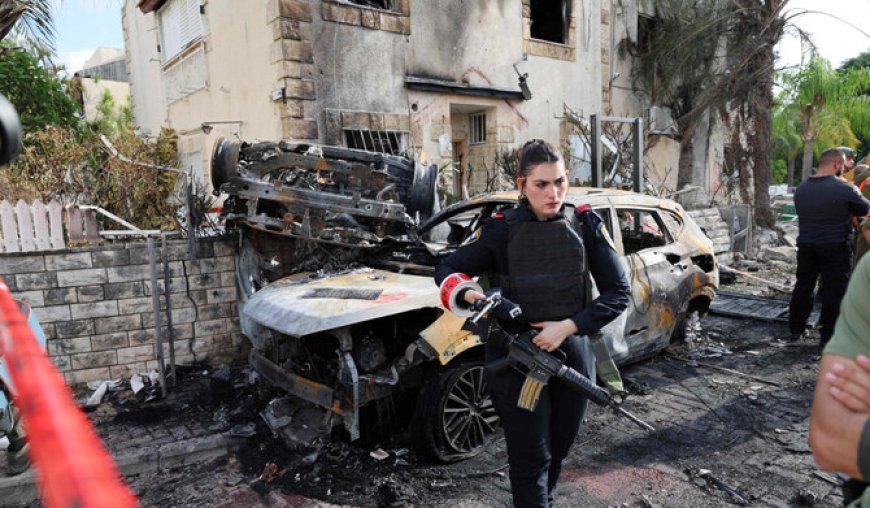Hezbollah Steps into "New Phase" in Rising Conflict with Israel
Declared a "new phase" in its continuous struggle with the Israeli military, the militant group has significantly escalated the combat as tensions between Israel and Hezbollah rise. On Sunday, Hezbollah's Deputy Chief, Naim Kassem, said that the group had entered a "open account" with Israel whereby military operations would becoming more intense unless a truce in Gaza is followed.

Declared a "new phase" in its continuous struggle with the Israeli military, the militant group has significantly escalated the combat as tensions between Israel and Hezbollah rise. On Sunday, Hezbollah's Deputy Chief, Naim Kassem, said that the group had entered a "open account" with Israel whereby military operations would becoming more intense unless a truce in Gaza is followed.
Southern Lebanon has seen devastating Israeli assaults recently; Hezbollah responded by firing rockets aiming at important military installations close to Haifa. This back-and-forth of rocket fire, airstrikes, and heavy bombardment has sparked worries that the already unstable border situation may slide into an all-out war between the two sides.
A New Conflict Phase: Hezbollah's Perspective
Kassem described the group's fresh strategy during the funeral of two well-known Hezbollah commanders, Mahmoud Hamad and Ibrahim Aqil. During an Israeli attack in southern Beirut aiming at a gathering of Hezbollah's elite Radwan Brigade, the two leaders were killed. Kassem said that these deliberate killings among Israel's military operations were not only raising tensions but also strengthening Hezbollah's determination.
Kassem's comments coincided with a particularly violent night of Hezbollah military activities, including rocket strikes on Israeli airbases and military manufacturing sites. "The residents of the north [of Israel] will not return, but rather displacement will increase, support will expand, and the Israeli solution will increase their predicament," Kassem said, exhorting Israel to stop running operations in Gaza if it hoped to de-escalate the situation on its northern border.
After over a year of a tight but very subdued posture toward Israel, Hezbollah seems to be indicating that it will increase its cross-border strikes. Kassem underlined that "we do not fear the most dangerous possibilities; threats will not stop us." This tougher rhetoric implies that, in the lack of a diplomatic answer, Hezbollah is getting ready for a protracted war.
The Context: A Fragile Area About to Collide
Long a flashpoint for regional and international strife, the Israeli-Lebanese border is among the most dangerous fault lines in the Middle East. Supported by Iran, Hezbollah has always positioned itself as a major actor in the opposition against Israeli military presence and impact in the area.
Since the beginning of Israeli strikes in southern Lebanon last year, meant to stop Hezbollah from growing its military might and influence close to the border, tensions have gradually increased. Though appeals for negotiations and cease-fires abound, both sides have shown little inclination for withdrawal.
As Israel struggles with continuous combat in Gaza, where its military is fighting a separate, fierce confrontation with Hamas, the most recent surge of violence results. Declaring that there will be no peace till Israeli military efforts in Gaza stop, Hezbollah's leadership has shaped the present escalation as directly related to the situation in Gaza.
Israel has, on the other hand, also suffered from Hezbollah's military reaction. Near Haifa, in Kiryat Bialik, rockets hit residential houses, causing multiple injuries to Israeli nationals. Targeting Lebanese communities close to the border, like Deir Al-Zahrani and Iqlim Al-Tuffah, the Israeli army answered with more shelling.
The extent of damage and mortality on both sides underscores the flimsy nature of the truce agreements that have been often breached. Civilians in Israel and Lebanon are preparing for what might be a protracted and terrible conflict without any end in view.
Strategic ramifications
Hezbollah's increased military operations point to a more general regional plan, maybe shaped by its partners in Iran and Syria. Hezbollah might be trying to provide a multi-front challenge for Israel by tying its activities in Lebanon with the circumstances in Gaza, so stretching its military resources and exerting pressure on it into concessions.
Israel, on the other hand, confronts a difficult conundrum. Although its military might is impressive, fighting concurrently in Gaza and Lebanon carries great dangers. Hezbollah is a tough opponent because of its advanced missile technology and inclination to engage in asymmetric warfare. Although Israeli military officials have cautioned that future provocations would result in even more severe reprisals, the possibility of escalation into a full-fledged war looms always over these events.













































